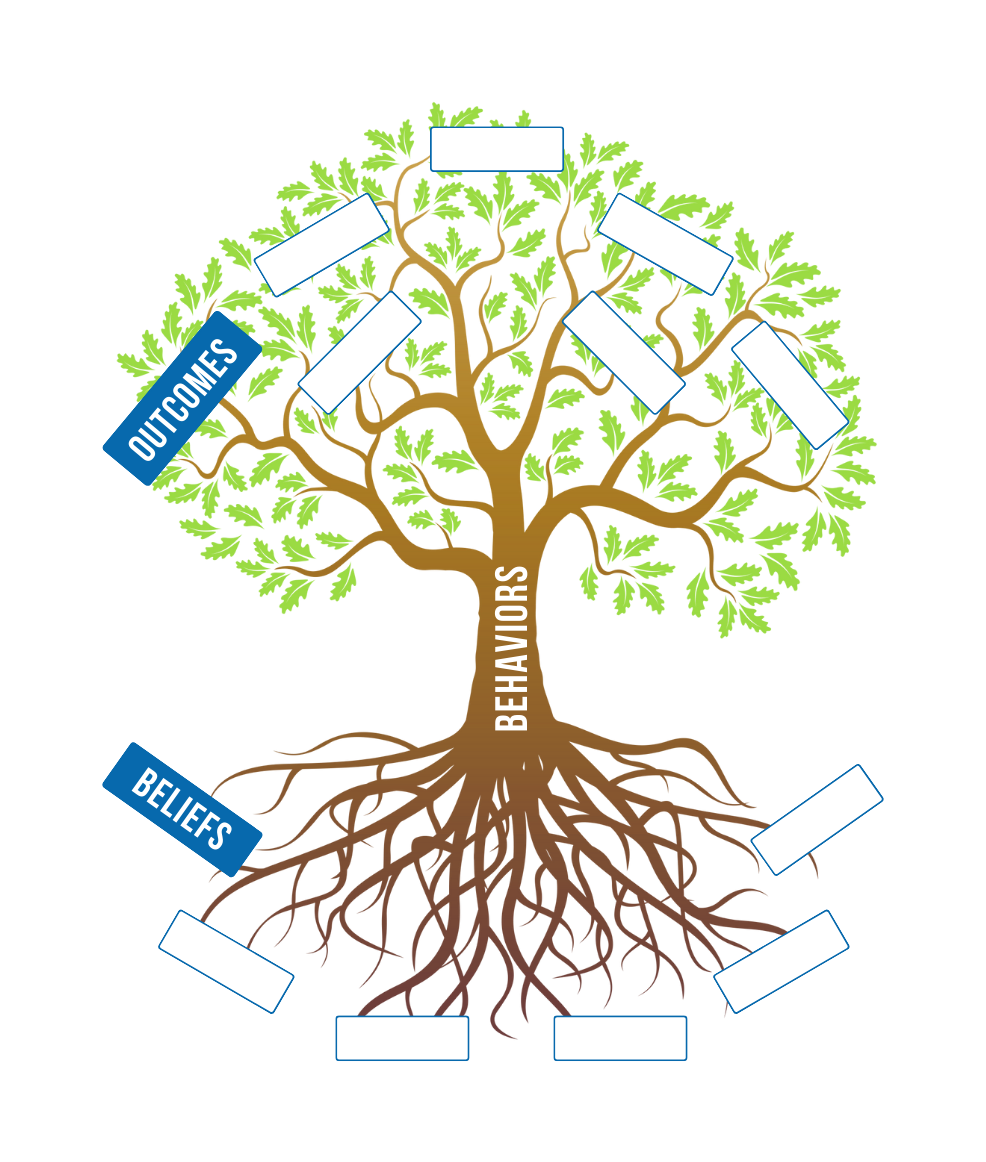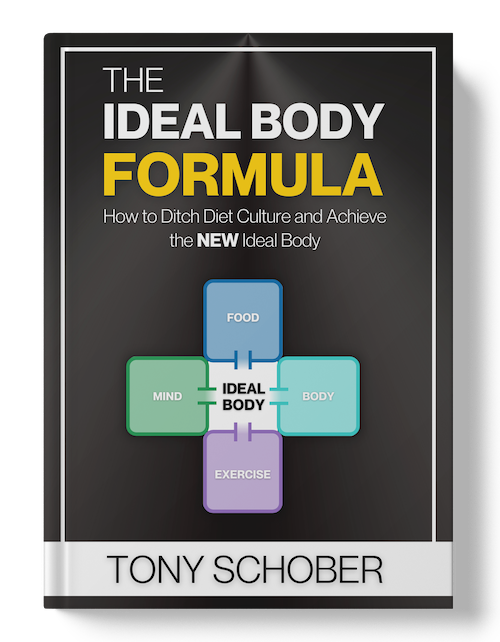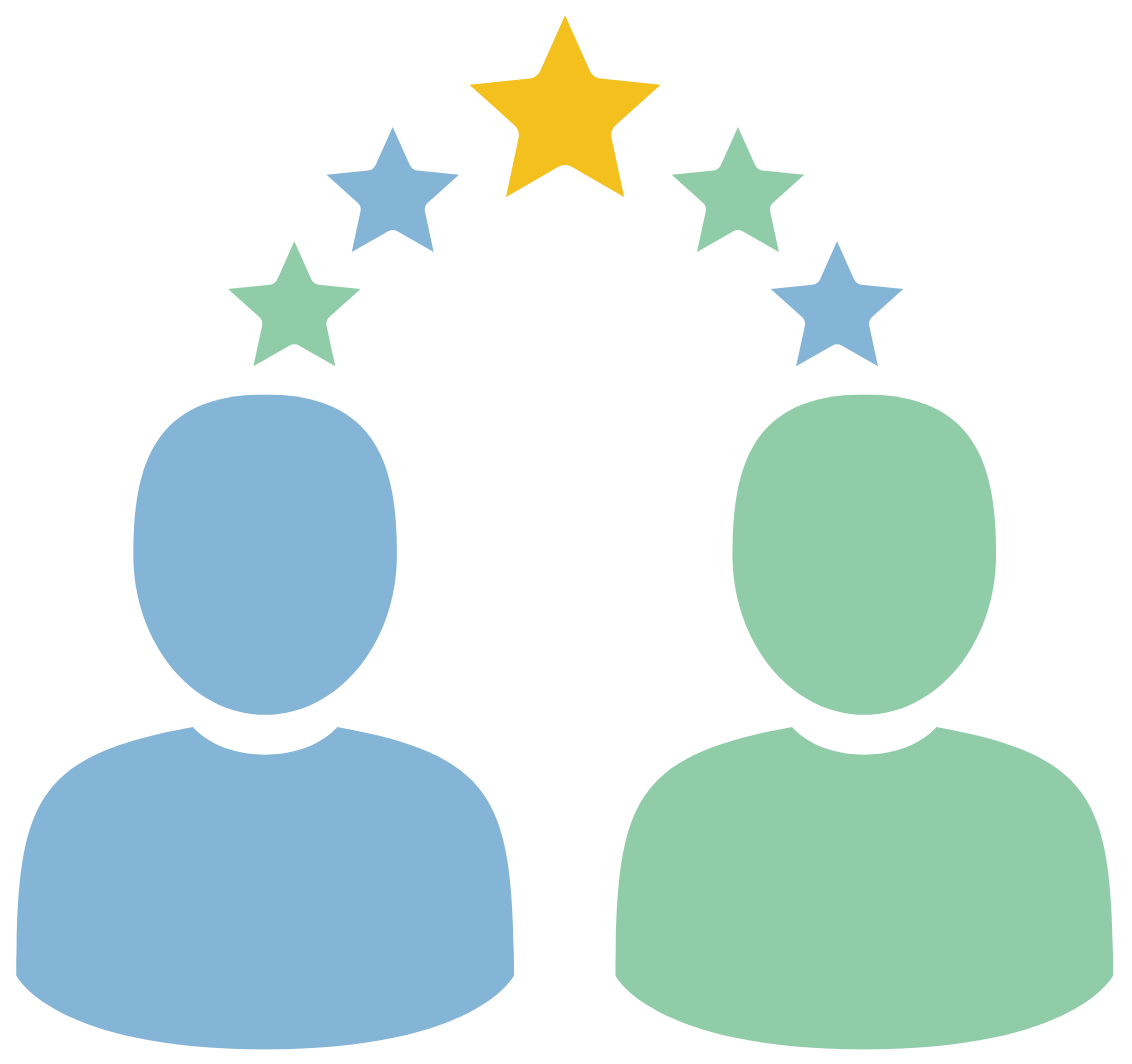The Identity Tree
Transformation comes not from changing what you do, but by changing who you are. And changing who you are is about building a new identity.
Everything you do and have in your life is a function of who you are being. Every action you take and outcome you experience is a side effect of the identity you’ve created for yourself.
On our journey we get so focused on what we want and what we have to do to get it. But actions and results are just outcomes. They are a side effect of who we are being.
I like to illustrate this concept with what I call an identity tree. Picture a tree with roots going into the ground, a trunk rising from the ground, and then branches and leaves coming from that trunk.
Now, when it comes to our life, the roots are our identity, the trunk is our behaviors, and the branches and leaves are our outcomes. So our outcomes naturally flow from our behaviors, which are born from our identity.

Our identity is made up of our thoughts, beliefs, and values. It’s the framework from which we live and experience our life. These beliefs can be limiting or they can be empowering. They are the operating system that drive the actions we take.
Most of us focus on what we want in our life. You want to lose 20 pounds. You want to wear a bikini. You want to look fit. These are all outcomes. We don’t do outcomes. They happen. They are side effects of our behaviors, aka results.
A smaller percentage of us focus on what we need to do – the strategy. This is OK, it’s a step in the right direction, and of course our behaviors matter. But they aren’t the be-all-end-all and shouldn’t be where you focus most of your attention.
You can focus on the trunk and the branches all you want, but unless your root system is taken care of, your personal growth is going to stall. Your beliefs influence your behaviors, which influence your outcomes. So if you want to change your outcomes, you can’t just water your leaves – you have to get down to your roots and address your beliefs.
The beliefs you have around food will determine what food means to you. And as we discussed earlier, the meaning you attach to food influences how you interact with it, which will affect how much you eat, what you eat, and why you eat.
The beliefs you have around your body will determine how you treat yourself, and whether your behaviors will come from a place of self-hate and rejection, or self-love and acceptance. And this will determine the health of your body.
The beliefs you have around exercise will determine what movement means to you. This will influence the type of exercise you do, how much of it you do, and every other decision you make with it. And that, of course, will affect your outcomes.
Your behaviors naturally flow from your belief system. And your outcomes naturally flow from your behaviors. If you want to implement healthy behaviors, they must be layered upon an operating system (your beliefs) that is in alignment with your desired outcomes.
If this sounds kind of out there to you, and you’re someone like me who needs more science and practicality, then you only need to look at the placebo effect to feel more grounded. The placebo effect is rooted in the idea that our thoughts, perspectives, and beliefs influence our outcomes. It’s so powerful, in fact, that scientists have to design studies to account for its influence.
So yes, set some outcome goals. Let them be your north star. Attend to your behaviors. Ensure they will lead to the outcomes you want. But be sure you take the time to understand and change your underlying beliefs, as that’s the level where true transformation happens.
Limiting Beliefs
When we don’t stop to question our beliefs, we end up taking them as truths.
False truths are dangerous. Beliefs are not always facts. When we assume they are, we end up being blinded to helpful information that could improve our lives. We filter out all evidence that runs contrary to our beliefs, and we only see the information that reinforces our current belief system.
This cycle can work for you or against you. Empowering beliefs create an upward spiral of improved life experiences reinforcing those beliefs.
Limiting beliefs create a downward spiral of diminished life experiences reinforcing those beliefs. In other words… you feel stuck.
This is important to understand because you can choose to subscribe to whatever beliefs you want, and whether they are universal truths or not doesn’t matter. All that matters is that they are your truth. And whatever truths you choose to live by will determine the outcomes in your life you achieve.
Empowering beliefs and perspectives will lead to more favorable outcomes than limiting beliefs and perspectives. So when you aren’t living the life experience you want, you need to look beneath the hood and see what beliefs you’re choosing to subscribe to, and decide which ones need to be challenged and cut.
We have a lot of limiting beliefs surrounding our goals. We tell ourselves stories that we’ve accepted as truth, when in reality, they are just beliefs we’ve taken from experiences that we’ve made part of our identity. Then we live this identity. We act it out. And we get the results of it.
The experiences we have are determined by the beliefs and perspectives we overlay onto our life situations. These beliefs and perspectives create our identity. This is the reason why if you want to change your life experience, you need to change your identity. From that identity flows behaviors that are in alignment with it. And those behaviors will lead to a series of outcomes.
Your beliefs and perspectives are the reason why two people can watch a house burn down, yet experience the situation in very different ways. If one of those people was watching it happen on the evening news, their experience will be different than the actual homeowner watching their house burn down in person. The house burning down (the situation) is the same, but the way each person is perceiving it is different. This will lead to a different life experience.
That might seem obvious, but we can take that same example and look at it another way. Let’s say we have two different people who are each watching their own homes burn down. Again, this is a very similar situation for each person. Yet if one person believes the fire destroyed everything that meant anything to them, while the other person sees the situation as an opportunity for a fresh start, they are going to have very different life experiences. Each person brought a different identity into the same situation. These identities were made up of different beliefs and perspectives, which lead to different results and experiences.
Your identity interacts constantly with your environment. The beliefs you have about your body will determine how you eat and how you exercise. It will determine your confidence and your self-worth. It will influences how you interact with the world and whether you take certain chances with your career or relationships. It will impact your entire life experience.
The beliefs you have about food or exercise will dictate how you interact with them. Limiting beliefs will force you to see these things as body manipulation tools. You might always feel like food has power over you or that exercise feels like a chore. This will keep you stuck in Diet Culture behaviors, which will negatively impact your life experience.
Here’s the thing – we aren’t aware of most of our limiting beliefs. They are so rooted in our identity and so accepted as fact that we’ve never stopped to question them. But once you realize that beliefs are why you are where you are today, you suddenly start becoming hyperaware of your thoughts and actions and why they happen. You stop trying to force external behaviors and outcomes and start trying to influence them naturally by internally changing your identity, beliefs, and values.
This is the reason why we’ve spent so much time in this book changing the way you think about food, body, exercise, and mind. We’re cultivating a new identity. Tips and tricks and other neat little strategies that Diet Culture promotes and that people are drawn to only lead to you developing limiting beliefs and negative experiences. It’s the reason why so many people feel stuck and frustrated living through the same cycle for decades.
But when you become aware of and challenge your beliefs and perspectives around food, body, exercise, and mind, you open yourself up to creating a new more empowering identity. And this identity will then interact with your environment in a more productive way. You see food differently. You see your body differently. Exercise takes on a new meaning. And all these beliefs coalesce into a life experience you can be happy with.
Self-Sabotage
Most people already know what behaviors are good for them. We don’t need more doctors and nutritionists telling us to eat more vegetables. We don’t need people telling us that we should be exercising. What we need is more people explaining to us why we struggle to do the things we know we should be doing to live the life we want.
That’s where self-sabotage enters the picture. How many times have you tried your best to incorporate healthy behaviors into your life only to talk yourself out of them eventually? The mind is extremely powerful. It can rationalize any behaviors it wants.
It’s the reason why I truly believe more people need a therapist than they need a nutritionist. Everything we do and achieve starts with your psychology. That’s why this entire book is based on healing your relationships with food, body, exercise, and mind. These relationships exist in your mind, and your behaviors naturally flow from the meaning you’ve attached to each of them.
You create a problem when you focus too much on behaviors, actions, and strategies and ignore creating an empowering identity. You create cognitive dissonance. In other words, how you are acting is in conflict with who you are. Your behaviors don’t align with your beliefs. Something feels off. And what typically happens in that scenario is you’re able to engage in these behaviors, but only in the short term. You white-knuckle and willpower your way through the process. But you can’t act out of alignment with who you are for an extended period of time. When your behaviors are in conflict with your identity, they don’t last, and neither do your results.
This is one of the biggest causes of all self-sabotage. It’s the reason you know what you need to do yet you don’t do it consistently for life. It’s the reason you keep starting and stopping healthy behaviors, give up on your workouts, or feel like you aren’t worthy to be loved and accepted as you are right now. It’s rarely the lack of desire that holds us back. It’s that we don’t believe we possess the power to change our lives to the degree we want.
Remember the Identity Tree? The roots (your beliefs) of the tree manifest the trunk (your behaviors), which then creates the leaves and branches (your outcomes and results).
Too many people are trying to insert a behavior into an ecosystem that doesn’t align with it. It’s like trying to inject new behaviors into an operating system that has faulty code. When you try to act in a way that is out of alignment with your beliefs, this new behavior has no solid ground to support it. It exists through willpower alone.
So you’re only able to maintain it as long as willpower isn’t depleted. Once depleted, whether from a demanding day or from something else that requires it, the temporary behavioral supports disappear, and you’re left with the core foundation – your beliefs, aka your identity.
Trying to build a habit on top of a misaligned belief is like trying to build a house on top of water. The behavior has nothing to latch on to, and when that happens, your current beliefs swallow up your best of intentions. You rationalize skipping your workout. You talk yourself into eating things you know won’t make you feel great.
Essentially, you revert back to the identity you were before, because you never really changed it. So your behaviors once again become aligned with who you are and always have been.
To stop self-sabotage you have align your behaviors with your beliefs. That means first becoming the person you want to be by challenging all the limiting beliefs that are keeping you stuck as your old identity.
These limiting beliefs are keeping you tethered to a past version of yourself. They are your current operating system. And they will continue running your old program and giving you the same behaviors and results until you change them.
Imagine yourself at your Ideal Body. Remember, your ideal body is the body you’re in when you have healthy relationships with food, body, exercise, and mind. It’s when you’re no longer obsessing about food, when you feel comfortable and confident in your own skin, and when you’re living your full life experience. Who is this version of yourself? How do you feel? Don’t focus on what you have or what you look like at your Ideal Body. Focus on who you are and what you believe about yourself and how you choose to show up in your life.
Your goal is to step into that future identity – today. To act in alignment with the person you want to be. Notice the differences in your current and future identities and start questioning your current beliefs that don’t align with your desired future self. Where did these limiting beliefs come from? Are they always true? How are they holding you back? What new empowering beliefs can you replace them with? What beliefs do you want to bring into your future? You have a choice. You can change your beliefs. And in doing so you can change your identity and your life.
Once your identity changes, you approach your journey differently. Instead of asking yourself “what do I do?”, you start asking yourself “who am I?”. You focus less on the things you need to do and more on the person you need to be. And with the latter, you automatically know what to do. You get to a point where you don’t just believe you can do it – you know that you will. It’s a done deal. It’s who you are.
You’re someone who takes care of themselves and respects their body? The choices you make will be in alignment with that identity. You don’t talk yourself out of them. It’s who you are. Self-sabotage doesn’t enter the picture because you’re behaving in accordance with your beliefs.
Change Your Past
So much of our past influences our life to this day. We had experiences that created an imprint in our minds. These emotional bookmarks are then held for us and are used to interpret the events of the now.
For example, if someone called you fat when you were 15 years old, and that moment created feelings of shame and embarrassment, then an emotional bookmark was created. And this bookmark holds its place via the use of a belief.
Going forward with your life this belief is used to filter your world. It influences the way you think, feel, and act.
Being called fat at 15 creates a belief that being a certain size is shameful and that other people will judge you and make fun of you. So going forward you act in a way that will avoid that pain.
These emotional bookmarks and beliefs are constantly being created through experiences. The more traumatic, the stronger the emotional bookmark, and the more deeply rooted the underlying belief becomes.
Understanding this you might think that the past is the past and there’s nothing you can do about it. The past can’t be changed, after all. Or can it be?
The past only exists in our minds. The original experience is over. It’s the beliefs that live on to the present moment.
These beliefs are what make you relive that past experience over and over again. It’s like you’re stuck in a loop. The original experience created the belief, and now the belief is forcing you to relive that original experience. The longer it goes on like this the more reinforced it becomes.
Why does this matter? Because your past and present are experienced through the lens of your current beliefs. That’s what your life is – a never-ending series of experiences that are shaped by your beliefs.
So you can change your past (and future) by creating new beliefs. No, you can’t go back and change the original event, but you can change your past in all the ways that it impacts your present and future.
That’s what matters most anyways. You don’t have to carry the trauma of your past anymore. You can choose to let it go. You can choose to change your current beliefs so that you experience your past differently. Because how we interpret our past has less to do with our past, and more to do with our present.
Being called fat at 15 doesn’t have to impact your life at 40. Being rejected at 25 doesn’t have to influence your self-worth at 50. Nor does being criticized yesterday have to change anything about who you are or how you act today.
Remove the emotional bookmark of your past by changing your beliefs of the present. And let your future unfold using your new empowering beliefs of today.


